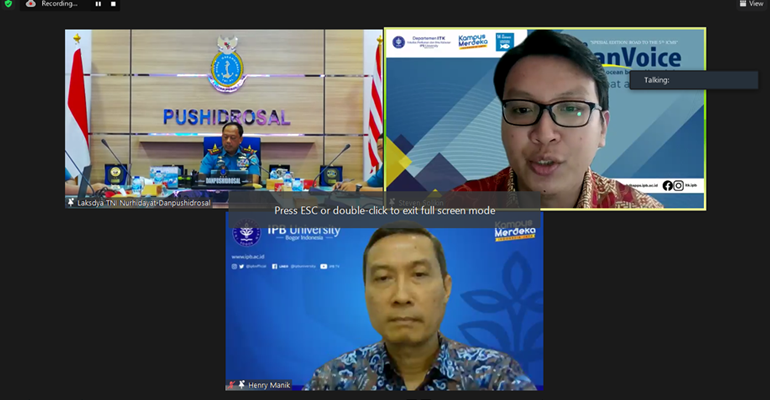IPB University Professor Explains Vital Role of Acoustic Science in National Defense

Prof Henry M. Manik, IPB University Professor of Underwater Acoustics and Marine Instrumentation, said Sound Navigation and Ranging (SONAR) technology is currently still the most reliable in underwater warfare activities. He said this technology is important to detect the presence and position of foreign submarines.
“However, problems can occur if there is a zone under the sea that is safe for docking or sound detection. This is where the shadow zone occurs, an area below the sea surface that cannot be detected by sonar or echo sounder instruments,” Prof Henry said in The Ocean Voice Special Edition Series 45 event organized by the Department of Marine Science and Technology, Faculty of Fisheries and Marine Science (FPIK) IPB University.
Prof Henry explained that in this shadow zone area, enemy submarines or foreign submarines are not tracked so that foreign submarines can carry out reconnaissance missions.
“The entry of submarines into the Indonesian sea area through the Indonesian Archipelago Sea channel (Alki) is mostly not monitored optimally, considering the number of patrol boats equipped with sonar is still limited,” said Prof Henry, author of the book Underwater Detection Techniques and SONAR Technology.
On this occasion, Prof Henry recommended three things including the need to update marine data such as temperature, salinity, depth, and sound speed in all Indonesian waters. He also suggested modeling and simulating the propagation of underwater acoustic waves in Indonesian waters in different seasons. Not only that, he suggested that the use of SONAR technology to detect submarines and other underwater objects needs to be implemented comprehensively with the cooperation of various parties.
“Modeling and algorithms help us to suspect shadow zone detection, considering the vast territory of Indonesia and some areas have not been surveyed, this modeling is very helpful for the detection of shadow zone areas. Modeling must have limitations so that is the importance of surveys to add to the completeness of the data,” continued Prof Henry.
Responding to this, Vice Admiral Nurhidayat, Commander of the Hydro Oceanography Center of the Navy, revealed several efforts that have been initiated by the Navy through collaboration with researchers from various research centers and universities. Some of them are through the Jalacitra 1 expedition in 2021 in the waters of Halmahera and Papua, the Jalacitra 2 expedition in 2022 in the Banda Sea, and Jalacitra 3 in 2023 in the Flores Sea.
“Existing hydro-oceanographic survey data can be used to map shadow zone areas, determine safe areas for navigation, create training areas, ammunition disposal areas, install underwater objects, clear minefields, and make military maps,” explained Rear Admiral Nurhidayat.
Meanwhile, the Dean of FPIK IPB University, Prof Fredinan Yulianda, appealed that maintaining the ecosystem and developing strategies for the utilization of small island resources in terms of technical, utilization, and security are joint obligations. (RAT/DHAA/ra). (IAAS/TNY)



